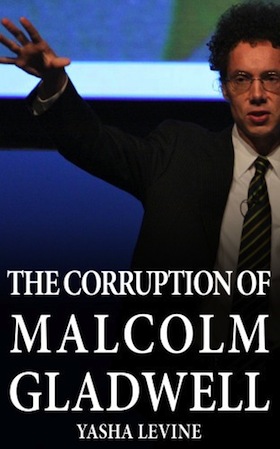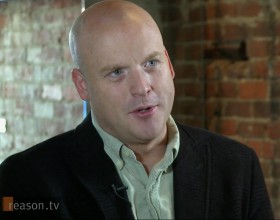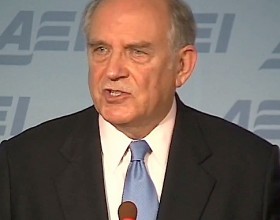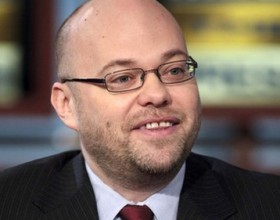Last week, I got an email from Malcolm Gladwell. He told me he read the S.H.A.M.E. report I wrote about him a few weeks ago, and asked if I had time to answer a few of his questions:
From: Malcolm Gladwell
To: levine@exiledonline.com
Date: Tue, 12 Jun 2012 3:56 PMI recently read your pieces about me. I have a number of questions I'd love to ask you. Do you have the time? Cheers, M.
Well, well. What an unexpected surprise! We had reached out to the New Yorker for comment on our exposé of Malcolm Gladwell, but New Yorker editor David Remnick initially refused to comment on the record . . . and then went silent altogether. That was about a month ago—before S.H.A.M.E. released Gladwell's profile and report, which quickly caught fire, and it seems, caught Gladwell's attention.
It was gratifying to see Gladwell belatedly deciding to drop me a line—not just personally gratifying, but I hope gratifying for everyone who's been helping us launch S.H.A.M.E. We're all in this together, folks, and rousting a busy "thought leader" like Gladwell is a pretty clear confirmation that we're doing exactly what we set out to do.
More importantly, I figured that if Gladwell was going to engage me like this, I'd have a rare opportunity to learn more about his sort of media corruption, the nuts and bolts of it all, especially the murky relationship between writing about the same corporate interests that happen to pay you tens of thousands of dollars in speaking fees.
From the start, it was a little odd that he signed off with the chummy "M" at the end of an oddly chummy email . . . but I had no problem with chummy, so long as I was going to learn something, so I got my best Californian chummy by way of Leningrad on, and emailed back:
On Thu, Jun 14, 2012 at 5:23 PM, Yasha Levine <levine@exiledonline.com> wrote:
Good to hear from you Malcolm. I welcome any questions you might have. I have plenty of things to ask you as well for a followup S.H.A.M.E. article we're working on. I want to ask more later, but for now here are a few questions we would like answers or comment on:
1) How much is AHIP paying you to speak at its June 22 conference in Salt Lake City?
2) How much is the Society for Human Resource Management paying you to speak at their event in Atlanta on June 25.
3) How much did Bank of America pay you for that multi-city speaking gig back in November 2011?
4) Had you taken speaking fees from any firms or associations from the finance and/or banking industry before the BofA engagement Please list names, dates and sums.
5) What is the New Yorker's policy on journalist or editorial conflict-of-interest? What is your personal policy or view on conflict-of-interest?
I'll follow up with more soon...
Glad you got in touch! Cheers,
YLPS: Congrats on the HBO pilot!
I was hoping he'd at least answer the first two questions, which referred to two brand new conflicts of interests Malcolm had on deck in his busy schedule.1
Some background: Gladwell was scheduled to talk at a conference put on by AHIP on June 22nd. Who is AHIP? Another one of those bland acronyms that conceals something sinister and awful—well, awful for everyone but a handful of health insurance plutocrats and the corporate speakers who rake in sweet fees at its events.
AHIP is the powerful health insurance industry lobby outfit fighting against universal healthcare and basically against anything that might bring America into line with the civilized world's approach to health care—from AHIP's self-interested perspective, it's a great thing that the US has the most expensive health care system yielding the worst results in terms of life expectancy, compared to other Western countries that have access to free and cheap healthcare. AHIP's role in profiting from this country's health care debacle is less well known than, say, the role played by the Kochs' Americans for Prosperity. But to give you an idea of just how serious they are, it was recently revealed that AHIP slipped the Chamber of Commerce over $100 million to lobby against government-run health insurance during Obama's push for healthcare reform. That's on top of spending huge amounts of money on astroturf campaigns and public relations offensives to smear anything advocating universal healthcare, such as Michael Moore's film Sicko.
So that's why I asked Gladwell about AHIP.
Three days after his speaking engagement at AHIP, on June 25, Gladwell was booked to speak at a Society for Human Resource Management (SHRM) event in Atlanta, Georgia. SHRM is one of America's oldest anti-labor/union-busting organizations. Recently SHRM helped lead the propaganda campaign to defeat a bill that would end wage discrimination against women. Right now, SHRM is lobbying to weaken union elections rules, stacking the decks even harder against labor, as if that was needed.2
So those are the sorts of outfits that Gladwell takes checks from—ones that profit from off sickness and misery, and crush labor on behalf of corporate power.
Both gigs presented obvious conflicts of interest for Malcolm Gladwell, assuming he or the New Yorker still believe that journalists shouldn't take money from the people they write about. The problem is this: Malcolm Gladwell has written about healthcare issues and unions on several occasions, oftentimes in ways that synced with the interests of AHIP and SHRM.
For example: a 2005 article for the New Yorker in which Gladwell wrote that the reason why the USA is the only Western country without universal health care was all the fault of labor unions, an interpretation of history that completely ignored the role played by big business, the medical lobby, and corporate industry front groups, just to name a few of the mega-interests arrayed against universal health care following World War Two. For Gladwell to airbrush corporate power out of the picture like that and instead lay all the blame square on labor unions is the type of skewed, right-wing revisionist history lesson you'd expect from Glenn Beck. Of course, Gladwell isn't as crude as Beck in his delivery, but in substance, he's closer than I or most people would ever have imagined. At least people don't mistake Beck for a journalist—whereas Gladwell is ordained by the New Yorker. To top it all off, Gladwell takes tens of thousands of dollars from these outfits in speaking fees, while at the same time inserting messages friendly to their interests into his New Yorker "journalism" pieces. You tell me who's more toxic between the two.
So that's why I was so curious for answers to my questions about his upcoming (at the time of my email) speaking events. Instead of getting some answers, I got a rain-check and the first sign of what was bothering Gladwell:3
On Jun 14, 2012, at 2:39 PM, Malcolm Gladwell wrote:
Dear Yasha.
All in good time. It is my turn to ask questions.
Can we start with the original article in the Washington Post that apparently caught your eye? The news article on the costs of smokers?
Can you explain to me why you interpreted that article as being in the interests of the tobacco industry?
Just curious. M.
This was odd. The man was exposed in a thoroughly sourced investigation as someone who for 25 years has been consistently promoting the interests of tobacco, pharma and Wall Street, all while posing as a credible journalist— and now that he had the chance of confront his accuser and defend himself, all he wanted to know was what caught my eye about just one of the many articles I cited as evidence? Gee, I don't know where to start. How about the headline, that caught my eye: "Not Smoking Could Be Hazardous to Pension System"?
Puzzled, I wrote back:
On Thu, Jun 14, 2012 at 8:43 PM, Yasha Levine <levine@exiledonline.com> wrote:
Malcolm, I assume this is the paragraph you're referring to:
The article, headlined "Not Smoking Could Be Hazardous to Pension System," was not reporting new news, but simply recycling stale tobacco propaganda: a 1987 industry study called "The Social Security Costs of Smoking," produced by the notorious National Bureau of Economic Research, an organization with ties to the tobacco industry and bankrolled by the biggest names in right-wing corporate propaganda funding—some of the same foundations that funneled cash to one of Gladwell's first employers, the Ethics and Public Policy Center.
What exactly do you find wrong with it?
Are you aware that the study you used as the basis for your article was a favorite of Philip Morris as well? Could you comment on the fact that the study you used in your article was cited favorably by Philip Morris, and placed on a list of talking points that they promoted to counter the "claim" that smokers cost Medicare more than nonsmokers? You can read the talking points memo here at your leisure. It's also positively cited in other tobacco industry documents, including this 1987 Tobacco Institute newsletter.
I hope this answers your question.
Now, it's your turn to answer mine.
YL
1) How much is AHIP paying you to speak at its June 22 conference in Salt Lake City?
2) How much is the Society for Human Resource Management paying you to speak at their event in Atlanta on June 25.
3) How much did Bank of America pay you for that multi-city speaking gig back in November 2011?
4) Had you taken speaking fees from any firms or associations from the finance and/or banking industry before the BofA engagement? Please list names, dates and sums.
5) What is the New Yorker's policy on journalist or editorial conflict-of-interest? What is your personal policy or view on conflict-of-interest?
Again, I hoped to get some answers from him, something to shine a light into the murky world where A-list journalism meets corporate propaganda and somehow manages to conceal it all. Here, by the way, is a screenshot of an advertisement for Malcolm's speaking engagement for the health insurance lobby:
You probably won't be surprised by Gladwell's response: He didn't answer my questions. Instead, he continued pressing me on "what I think" about his WaPo article, zapping me with what I guess was supposed to be thought-leader voodoo or marketing-world psychology. Whatever it was, it wasn't how I imagined a serious New Yorker journalist would address questions and evidence of media corruption:
On Fri, Jun 15, 2012, at 10:22 AM, Malcolm Gladwell wrote:
Thank you for getting back to me Yasha. Yes. I saw that part of your article. But it doesn't answer my question. I'm interested in what you think of the study's argument. Why do you think that someone who writes an article about how smokers die young--and as a result use less social security--is shilling for the tobacco industry? Do you think that companies, as a whole, are delighted with people who write stories about how they are killing off their customers?
Somehow he seemed convinced that the way to salvage his reputation was not by debunking S.H.A.M.E.'s evidence with counter-evidence of his own; but rather, by engaging me in a game of wordplay footsie. Perhaps this sort of thing goes over well in the National Journalism Center seminars that he trained up in, but to me, it was almost sad. Here's one of America's biggest selling authors and leading journalists; a guy who's been getting away with murder for years now . . . and no one's taken him to task for it! It's as though a vital part of his brain had gone to flab. He doesn't even know how to lie and deflect well—what a sorry state for a leading corporate flak to find himself in.
I was getting annoyed, so I tried dropping a direct question to get at least one answer from him before this exchange ended.
On Fri, Jun 15, 2012 at 6:00 PM, Yasha Levine <levine@exiledonline.com> wrote:
You asked:
Do you think that companies, as a whole, are delighted with people who write stories about how they are killing off their customers?
I can't speak for "companies as a whole" but I can say with certainty that a specific company, Philip Morris, was delighted with the specific study that you based your article on—they were so delighted, in fact, that they recommended and used it for their PR talking points. I'm providing a link to that talking points memo, once again. I hope that answers your question.
So far I've been answering your questions and you haven't answered a single one of mine. Could you please answer at least this one:
Did Philip Morris pay you to speak at the company's recruitment event in 2005? If you wish, a simple yes or no answer will suffice.
YL
It worked! But in a kind of weird way, in terms of what it revealed. Here was Malcolm's response:
On Sat, Jun 16, 2012, at 04:14 PM, Malcolm Gladwell wrote:
Sigh. Talking to you is a bit like talking to a brick wall. No you still haven't answered my question..
Here is what i'm trying to get you to understand. In the early 1990's, there was a lot of interest among anti-smoking activists in taxing cigarettes more heavily in order to pay for the health burdens caused by smoking. In order to quantify those burdens, economists began looking closely at the mortality and morbidity patterns of smokers. And what did they find? That smokers don't cause excess health burdens because cigarettes kill them so quickly and efficiently that they die before they can burden Medicare and Social Security. In other words, in presuming to tax cigarettes more heavily, anti-smoking advocates underestimated how lethal cigarettes actually were.
Do you not see how deliciously ironic that was? And why I thought, as a reporter covering health and science, I thought that study would make for a great story? And now I learn that Philip Morris itself was touting the same study--which is doubly ironic. Here is a company that for years said they shouldn't be regulated because smoking had no ill effects. And now all of a sudden they were saying that they shouldn't be regulated because they were killing their customers before they reached retirement age!
Writing about that study wasn't "shilling" for the tobacco industry. It was the opposite. It was exposing the absurdity of the tobacco industry's position. The reason I wrote to you Yasha is that I simply wanted you to acknowledge that there is a another way to look at that study. So my question: can you acknowledge that?
In answer to your question, I have spoken once in my career at a conference sponsored by a company with an interest in the tobacco business, and I donated my fee to charity.
That last bit had me rolling on the floor, I couldn't believe I'd read what I just read. What's the psychology term for someone who answers a question like that? Displacement? Disassociate? Hell if I know. But I guess that's what the brain does to deal with taking money from companies that kill millions of people around the world every year for profit. Gladwell had actually described Philip Morris as "a company with an interest in the tobacco business." Which is pretty funny, considering that Philip Morris is the biggest tobacco company in the world, maker of Marlboro, the best-selling cigarette brand of all time.
What's really telling is that Gladwell alleged to me that he donated his "fee"—the money Philip Morris paid to him—to "charity." First off, it was a clear admission that Gladwell understood there's something morally and ethically wrong for a journalist to take money from the tobacco industry for speaking engagements. It opens up a fresh new host of questions about his thoughts on journalism ethics, conflicts-of-interest, which corporate speaking engagements are ethical and which aren't, and so on.
Another thing: Gladwell's quick and defensive admission that he donated Philip Morris's money to charity kind of contradicts something he told New York magazine in 2008: "I never deal with any of the money-negotiation part ... It just goes into my account, so it's like I'm not even aware." Clearly, Gladwell is aware of the money and where it goes when he wants to be—or needs to be, in this case.
Lastly, if Gladwell is to be believed and he donated his Philip Morris "fee" to charity, that means essentially he made a choice to speak for free for Philip Morris—or put another way, of all the monies a charitable person could give to a charity organization, why give them money tainted by tobacco-death profits? It also raises the question of why, other than maybe receiving a tax write off as a result of his charitable contribution, would he donate his valuable speaking time to helping Philip Morris? That mean he's passionate about helping Philip Morris continue reaping billions from the deaths of millions? Everything about this is wrong: Speaking to drug lords for free, donating their dirty tobacco-death money to "charity". . .

To clarify how weird this all is, here is how Philip Morris described Gladwell's gig in its "highly confidential" 2005 performance summery:
Value our employees: Our efforts to develop world-class leaders remain a priority. PM USA continued to enhance its leadership development efforts by introducing new sales training programs, increasing the number of employees who have facilitated and attended our leadership development programs and revamping our recruiting efforts. . . . The program was attended by members of PM USA's senior leadership team and included an overview of PM USA, our Mission and core strategies, a tour of the factory, a lecture by best-selling author Malcolm Gladwell and two evening dinner receptions. Based on formal evaluation surveys and subsequent discussions and communications with the attendees, the event was very well perceived and rated by the attendees and is having a positive impact on our ongoing recruiting efforts.
In other words: Gladwell donated his time to help Philip Morris recruit young business school talent for management positions. Gladwell, you're like a modern-day Sonya Marmeladova, Dostoevskii's "whore with the heart of gold"!
From: Yasha Levine <levine@exiledonline.com>
To: Malcolm Gladwell
Date: Mon, 18 Jun 2012 2:25 PMDon't sigh Malcolm, you're doing well.
You asked:
Do you not see how deliciously ironic that was?
To answer your question: No, I don't see the "delicious irony" in anything the tobacco industry adopts into its PR strategy, when one considers that cigarettes kill over 400,000 people per year in the US, and millions per year worldwide. For you to try to characterize the tobacco industry's PR strategy—the propaganda that enables the deaths of millions of people per year that you so willingly aped on the pages of the Washington Post—as "deliciously ironic" is an abdication of responsibility as a journalist, and frankly downright disturbing.
Your other question was:
Writing about that study wasn't "shilling" for the tobacco industry. It was the opposite. It was exposing the absurdity of the tobacco industry's position. The reason I wrote to you Yasha is that I simply wanted you to acknowledge that there is a another way to look at that study. So my question: can you acknowledge that?
No, I will not acknowledge it, because there is no evidence in the article supporting your claim. You said you were "exposing the absurdity of the tobacco industry's position," but you did no such thing. And for you to attempt to portray it that way now, 12 years later, is a crude attempt at revisionism.
So far I've been answering your questions, but you continue to focus on this one article. Could you answer at least a few of my initial questions—questions which you have repeatedly ignored:
1) How much is AHIP paying you to speak at its June 22 conference in Salt Lake City?
2) How much is the Society for Human Resource Management paying you to speak at their event in Atlanta on June 25.
3) How much did Bank of America pay you for that multi-city speaking gig back in November 2011?
YL
And that's where the conversation stops. It's been four days now since my last email, and Malcolm Gladwell still hasn't replied . . . I guess he was too busy prepping for the AHIP health insurance conference, packing his bags and rehearsing his speech. I believe that speech is called "Cowboys Versus Pit Crews: How to Build a Sustainable Health Care Delivery System." Should be a good one.
Malcolm, if you're reading this—please don't run away. You've made plenty of money by now, why not come clean and give us some personal insight into the world you inhabit—where trusted institutions like the New Yorker are exploited for their marketing value to unwitting readers. You've profited long enough, and handsomely enough, from abusing the public's trust and doing your part in degrading democracy. You've profited; everyone else has been degraded. You owe it us to shine some light on that sordid world—and to help us get some of our lost power back.
We're waiting...
Read Malcolm Gladwell's S.H.A.M.E. Report & Profile...
Yasha Levine, President of S.H.A.M.E., is an investigative journalist and a founding editor ofThe eXiled. His work has been published by Wired, The Nation, Slate, The New York Observer and many others.
Support S.H.A.M.E. Help us expose corporate shills. Contribute with PayPal or WePay…
- Gladwell spoke, as scheduled, at AHIP's Institute 2012 conference on June 22. His talk focused on how the U.S. medical system was broken because it did not eliminate “chauffeurs”—by which he meant that the medical industry wasn't replacing its workers with machines and automation fast enough. Read the account here. [↩]
- S.H.A.M.E. member Steven Levitt has been known to speak at SHRM events as well. [↩]
- In fact, this is not the first time Malcolm Gladwell did a speaking gig for the health insurance industry. In his 2004 disclosure statement, which predated his New Yorker article on unions and healthcare, he admitted:
"Have I given paid speeches to companies or industries mentioned or affected by that article? Yes I have. As I stated earlier, I have given my Tipping Point talk to groups of doctors, hospitals, insurers, as well as Pharmacy Benefit Managers and groups funded by the National Institutes of Health. More specifically, I have on several occasions over the past four years given paid speeches on the Tipping Point to pharmaceutical companies."
[↩]






